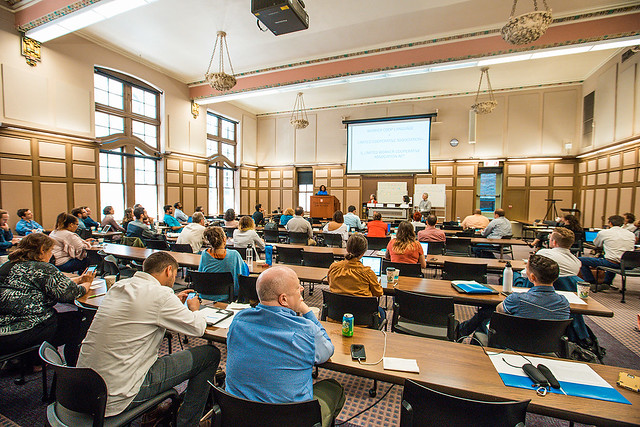By Sara Stephens, Law Center Staff Attorney
One of the biggest hurdles cooperatives face is finding legal and accounting help from professionals who understand their business and governance model. Meanwhile, attorneys and accountants who want to support cooperatives have few places to turn for education and mentoring in cooperative law. To address these gaps, we're fiscally sponsoring the Cooperative Professionals Guild!
The Cooperative Professionals Guild's New Horizons and Best Practices for Cooperative Professionals Conference brought together attorneys and accountants for three days to learn from one another’s practices, initiate newcomers into cooperative law and financial topics, and dig into legal and accounting challenges confronting our clients. Our agenda was packed with six sessions ranging from innovative structures for worker ownership and cooperative real estate investment, new tax bill implications for cooperatives, securities law implications of having members in multiple states, and more!

I learned SO much at the conference, I feel like I am still processing all of the takeaways. There were many lessons in both substantive areas of the law as well as lessons about who we are as an organization and the priorities of our members.
A few of the legal takeaways for me personally:
-
Despite the IRS instructions accompanying the form 1040, there is a strong legal case that patronage dividends are not subject to self-employment tax. The best strategy is to include it as “other income” and not report it on Schedule C. However, a coop member reporting it this way, making the argument that it is an allocation of profits and not employment income, should be prepared to respond to an IRS audit. I wonder if the Law Center should draft a template response letter for people in this position...
-
We learned about an innovate housing cooperative for people with disabilities that combines a nonprofit fiduciary, an LLC developer, and a cooperative corporation. This structure allows for solid protections of the social purpose of the project, significant investment capital, and a democratic decision-making structure giving voice to residents or their representatives.
-
Coops routinely use the intra-state securities law exemption to avoid federal regulation of membership investments. However, the securities law session helped me realize this exemption is “riskier” than I thought. Just one out-of-state investor can cause the exemption to fail. This is particularly important in the case of consumer coops or REICs who might issue memberships through an online interface. They need to ensure that they are only receiving membership buy-ins from local residents.
-
The concept of sweat equity is more complicated than I thought! If a coop gives a member equity (like a membership interest or preferred shares) in exchange for work, the value of that equity is immediately taxable. A workaround is to have a qualifying contract that would allow the sweat equity to be taxed later once it vests, but the contract needs to include a risk of forfeiture. I need to read up on this more so I can advise clients better about this strategy.
As a member of the Guild’s planning committee, I learned that:
-
We can actually put on a successful conference all by ourselves! Even though none of us are event planners, and we didn’t hire one, we pulled together some really great content, created an inviting social space, and connected cooperative attorneys and accountants with potential mentors and partners for their work.
-
The group's priorities for our future identified in our planning session include (1) creating an online space for sharing resources and learning from each other; (2) having a directory of cooperative attorneys and accountants that is sortable by location, areas of expertise, etc.; and (3) developing mentorship among newer and more seasoned professionals, both in substantive areas and in general practice management. These will be goals that we move toward as a planning committee in the coming months. One of the concrete ways we are already working on the first goal is by inviting all Guild members to join the Law Center’s Law for Economic Democracy Network, which has a group specifically for the Guild’s use as an online forum space.
I’m excited to see the Guild continue to develop this year, to even better support cooperative attorneys and accountants. We will begin planning our conference for 2020 very soon, which will be in Denver, Colorado. We will also build out a more formal membership structure and governance process, as well as advance the priorities identified by the conference attendees. The excellent discussions and feedback we received at the conference will propel this organization into the next phase of its development as a home and training ground for cooperative attorneys and accountants.









